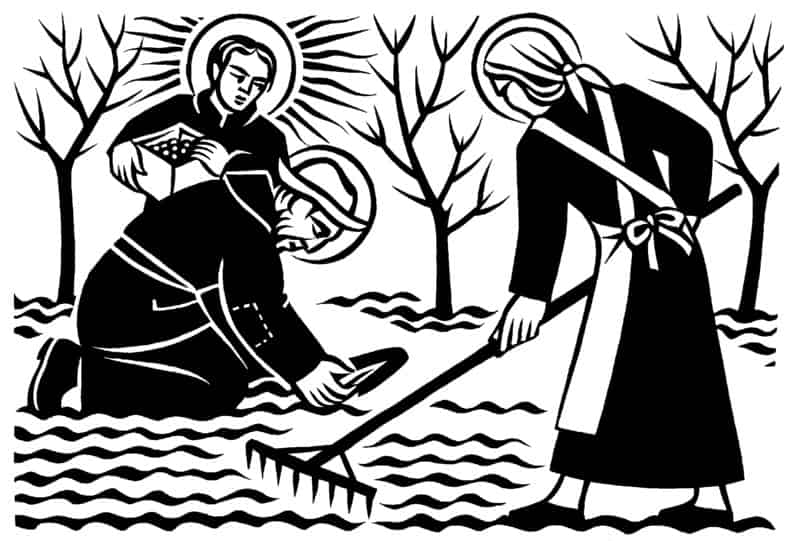The following is an abridged version of the Introduction to the Journal of Moral Theology’s Special Issue “Vocation, Friendship, and the Catholic Moral Tradition,” which collects essays by current or recent members of New Wine New Wineskins (NWNW), an association for early-career Catholic moral theologians. The full introduction and all the issue’s essays are available here: https://jmt.scholasticahq.com/issue/4730. The post also inaugurates a new collaboration between NWNW and the CMT Blog, which will now feature content by NWNW’s every Monday. Stay tuned!
New Wine New Wineskins: A Manifesto for Early-Career Catholic Moral Theologians
Alessandro Rovati and Matthew Philipp Whelan
NWNW started in 2002 to give moral theologians at the beginning stages of their careers a place to, as David Cloutier and Bill Mattison state, “engage in scholarly activities relevant to the field of moral theology and devote particular attention to the vocational meaning of being a moral theologian in today’s Church and academy.” Since then, the group has regularly met for a yearly symposium at the University of Notre Dame’s Moreau Seminary for a mix of dialogue with established moral theologians, presentations of the members’ research, as well as fellowship and common worship.
NWNW is not a unified school of thought. Its current and past members come from various backgrounds, are formed in diverse graduate programs, and have differing ecclesial and theological sensibilities. In fact, from the beginning, the group intentionally strived to establish an environment where diversity of perspective would be cherished, not just tolerated. The cultivation of friendship has been crucial to that endeavor.
There are three main reasons NWNW has striven to establish such an environment. First, NWNW takes to heart St. Paul’s insistence that the Holy Spirit endows people with a diversity of gifts and charisms for the sake of edifying the church (cf. 1 Corinthians 12). What is true for the ecclesial community is also true for the moral theological community–or indeed, any community. The other, in her diversity, is always a gift to be welcomed, a companion God gives to enter more deeply into the truth. Second, contestation, debate, and questioning are all part of a healthy, living tradition. Consequently, creating intellectual spaces where disagreements may be articulated and discussed constructively is essential. NWNW hopes to be just that: an association where conversations across differences are cultivated, not shut down. Third, in light of the previous two reasons, the polarization that so often determines our society, the church, and even the academy must be resisted. Polarization is like an acid upon genuine theological exploration. Besides leading people to lose sight of the complexity of moral issues, it ends up “othering” those with a different perspective, including those within the same ecclesial body. NWNW, instead, seeks authentic encounters among scholars with differing views.
While it is hard to describe NWNW as a school of thought, the association’s work has fostered a distinctive ethos among its members. Such an ethos is constituted by three fundamental and interrelated commitments.
First, doing moral theology is above all a vocation. NWNW’s members understand the work of moral theology as an expression of their faith. They think of their scholarship as profoundly connected to their personal moral formation and call to discipleship. Furthermore, by comprehending the work of moral theology as a vocation, members emphasize the ecclesial rootedness of theology, in which scholarship is always ultimately a service to the church and its people. It is no mistake that so many of NWNW’s members combine their individual research and work in the academy with a thick involvement in the life of their local church, be it by teaching seminarians, permanent deacons, and the laity, collaborating with their dioceses, or volunteering in their parishes. Finally, the group has always included space for common prayer and the celebration of the Mass in its gatherings to emphasize that the life of faith must feed theological work, just as theological work, in turn, must nourish a person’s faith journey.
Second, Aristotle famously said in the Nicomachean Ethics that friends are integral to the good life, and we believe the same is true of the life of the moral theologian as well. Over the years, NWNW has created an extensive network of friendships that have provided support to its many members and given them occasions for creative projects, theological explorations, and other common undertakings. Our annual symposium is characterized by many occasions for informal conversations, a casual ambiance, and countless heartfelt exchanges (often accompanied by good drinks and late nights together). Such a context has allowed three generations of moral theologians to enter into intimate relationships that last beyond official membership in the association. It is this climate of friendship that has allowed NWNW to resist polarization, giving space to the bonds of charity that come from the common belonging to the church over and above any possible disagreement. The same friendship has allowed constructive dialogues across differences and provided many an opportunity to expand their horizons and add depth and complexity to their theological vision. Finally, the sense of belonging to one another that characterizes NWNW has allowed the association to be especially attentive to and inclusive of those whose academic location makes them particularly vulnerable to being excluded from the conversation. NWNW always invites and financially supports contingent faculty, faculty in smaller colleges with little or no institutional support for scholarship, and graduates of Ph.D. programs that do not have the R1 universities’ prestige and network.
Third, NWNW’s members share a profound commitment to the Catholic moral tradition and to helping one another find within it lesser-known resources or unexplored paths. They put such a foundational knowledge at the service of today’s questions and pressing issues, and they are unafraid to ask questions about and probe the reasons for what the church teaches, knowing that to engage in such work is the way not only to better understand Christian commitments but to live them out more fully as a witness to the world.
The result of the NWNW’s ethos, and these three fundamental and interrelated commitments that underlie it, is a way of practicing moral theology together with others that seeks to build bridges across theological, ecclesial, and political divides, that draws upon the church’s sources creatively to reflect on previously unanswered questions, and that looks for ways to embody the Christian call to holiness today.



